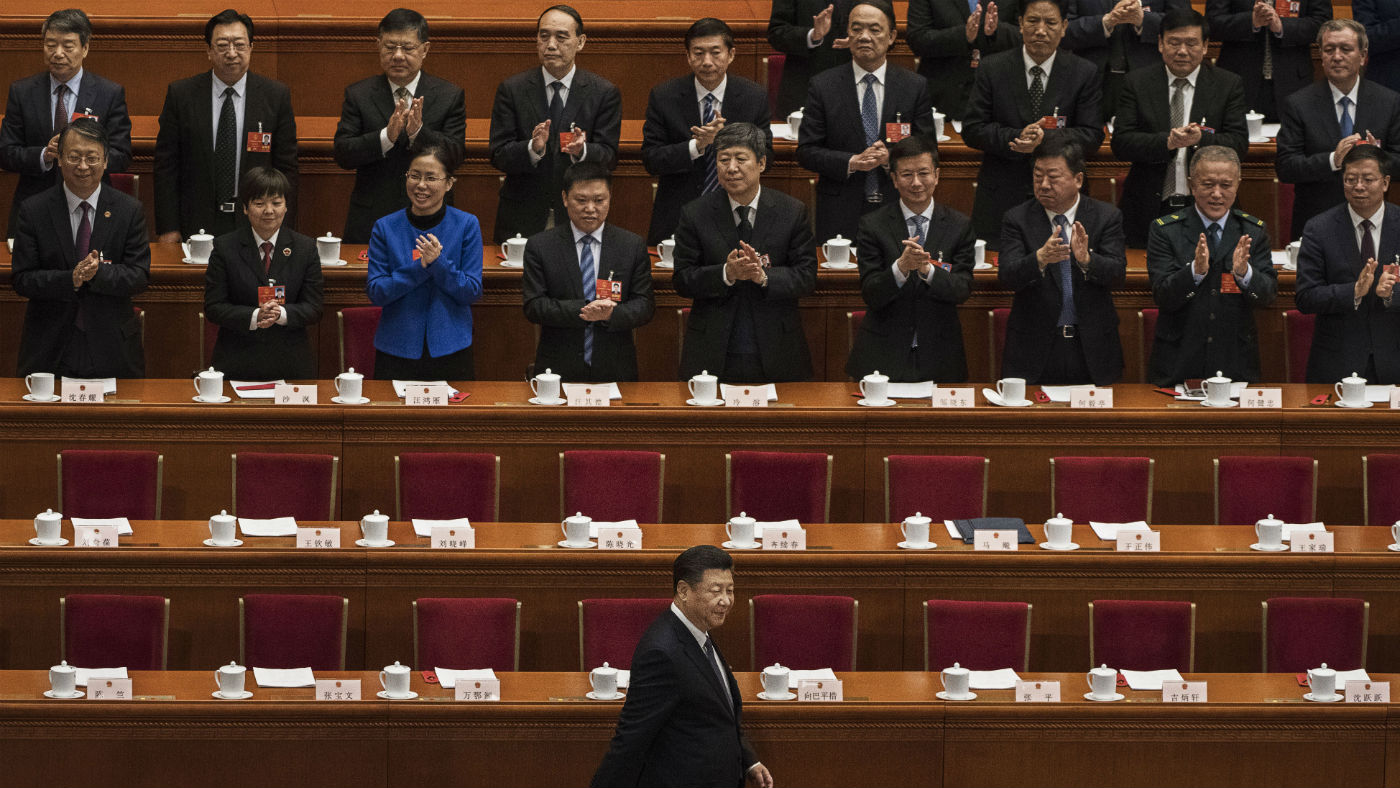China votes to make Xi Jinping ruler for life
Near unanimous vote clears the way to end presidential term limits

A free daily email with the biggest news stories of the day – and the best features from TheWeek.com
You are now subscribed
Your newsletter sign-up was successful
China’s Communist Party has voted through changes to its constitution abolishing presidential term limits, opening up the possibility Xi Jinping could rule for life.
The controversial measures, first announced last month, were passed by the National People’s Congress. They included amendments which add a political philosophy called, called Xi Jinping Thought, to the constitution and the creation of politically driven “supervisory commissions”, which has been given the task of investigating party members – all aimed to shore up Xi’s supremacy.
Of the 2,964 delegates only two voted against abolishing term limits, with three abstentions, “a small hint of the outrage the move has caused in some liberal circles”, says The Guardian.
The Week
Escape your echo chamber. Get the facts behind the news, plus analysis from multiple perspectives.

Sign up for The Week's Free Newsletters
From our morning news briefing to a weekly Good News Newsletter, get the best of The Week delivered directly to your inbox.
From our morning news briefing to a weekly Good News Newsletter, get the best of The Week delivered directly to your inbox.
There have also been rumblings of dissent outside the upper echelons of the party. Online censors have been blocking discussion of the topic, including images of Winnie the Pooh, after social media users began using the cartoon character to represent Xi.
“It is now hard to see Xi Jinping being challenged in any way whatsoever. He has amassed power the likes of which has not been seen since Chairman Mao Zedong,” says the BBC’s China correspondent Stephen McDonell.
Xi is widely regarded as the most powerful Chinese leader since Mao, yet critics see worrying parallels with the former communist dictator.
Term limits were first introduced in 1982 to prevent a repeat of the horrors of the Mao era – and opponents call the decision to scrap them “a calamity that risks plunging China into a new age of political turbulence and one-man dictatorship”, reports the Guardian.
A free daily email with the biggest news stories of the day – and the best features from TheWeek.com
Axios contributor Bill Bishop says: “Xi is working to obliterate any boundaries between party and state and to reinsert the Communist Party of China (CPC) into all aspects of China's economy and society — all while ensuring he's the unchallenged embodiment of the CPC.”
“The end result will be Xi's complete dominion over all parts of Chinese government and society,” he adds.
But some critics say the move is could also make Xi “politically vulnerable in the long run”, reports CNN.
Li Datong, a former editor of the state-run China Youth Daily newspaper and one of the few voices of open opposition told the broadcaster: “The top leader’s term limits are the biggest common denominator shared by all political forces in China. Its removal could trigger political infighting - that’s why this move is dangerous.”
-
 Why is the Trump administration talking about ‘Western civilization’?
Why is the Trump administration talking about ‘Western civilization’?Talking Points Rubio says Europe, US bonded by religion and ancestry
-
 Quentin Deranque: a student’s death energizes the French far right
Quentin Deranque: a student’s death energizes the French far rightIN THE SPOTLIGHT Reactions to the violent killing of an ultraconservative activist offer a glimpse at the culture wars roiling France ahead of next year’s elections
-
 Secured vs. unsecured loans: how do they differ and which is better?
Secured vs. unsecured loans: how do they differ and which is better?the explainer They are distinguished by the level of risk and the inclusion of collateral
-
 The fall of the generals: China’s military purge
The fall of the generals: China’s military purgeIn the Spotlight Xi Jinping’s extraordinary removal of senior general proves that no-one is safe from anti-corruption drive that has investigated millions
-
 Epstein files topple law CEO, roil UK government
Epstein files topple law CEO, roil UK governmentSpeed Read Peter Mandelson, Britain’s former ambassador to the US, is caught up in the scandal
-
 Iran and US prepare to meet after skirmishes
Iran and US prepare to meet after skirmishesSpeed Read The incident comes amid heightened tensions in the Middle East
-
 Israel retrieves final hostage’s body from Gaza
Israel retrieves final hostage’s body from GazaSpeed Read The 24-year-old police officer was killed during the initial Hamas attack
-
 China’s Xi targets top general in growing purge
China’s Xi targets top general in growing purgeSpeed Read Zhang Youxia is being investigated over ‘grave violations’ of the law
-
 Panama and Canada are negotiating over a crucial copper mine
Panama and Canada are negotiating over a crucial copper mineIn the Spotlight Panama is set to make a final decision on the mine this summer
-
 Why Greenland’s natural resources are nearly impossible to mine
Why Greenland’s natural resources are nearly impossible to mineThe Explainer The country’s natural landscape makes the task extremely difficult
-
 Iran cuts internet as protests escalate
Iran cuts internet as protests escalateSpeed Reada Government buildings across the country have been set on fire